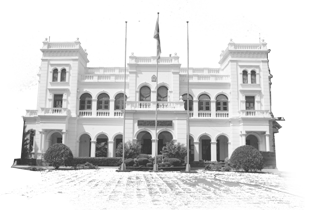A System to pay bus fare via bank cards
Prime Minister Dr. Harini Amarasuriya stated that, in line with Digital Economy Month, the official website aigov.lk on Artificial Intelligence is launched, and a system enabling passengers to pay bus fares via bank cards will be introduced.
The Prime Minister made these remarks today (10) in Parliament, responding to a question raised by a Member of Parliament.
The Prime Minister further stated that September has been declared as a Digital Economy Month as a part of the national initiative to accelerate in becoming a digitally empowered nation. One of the objectives is to raise public awareness on digitalization and demonstrate the government’s commitment towards building a digital economy in the future. Forwarding that purpose numerous programs will be conducted continuously in the month of September.
These programs aim to raise awareness among citizens, businesses, and institutions about the importance of identifying and using digital tools, as well as to accelerate every sector to adapt into the e-Government platforms, digital financial solutions, and innovations driven by Artificial Intelligence.
The government expects that accelerating digital projects implemented by the Ministry of Digital Economy with the partner institutions will allow citizens and businesses to receive the benefits promptly. By 2030, the government expects to expand Sri Lanka’s digital economy by USD 15 billion, and 12% of GDP, and to increase the digital exports up to USD 5 billion, and expand the digital workforce to 2 lakh.
This Digital Economy Month creates a platform to communicate these aspirations and to achieve these objectives by mobilizing both the public and private sectors. Another objective is to position Sri Lanka as a leading hub in South Asia for technological innovation, digitalization, and Artificial Intelligence development.
Digital Economy Month is not only a symbolic initiative but also a practical mechanism to bring out Sri Lanka’s digital ambitions to the world by accelerating awareness and it is a program that will deliver direct benefits to citizens in the future through innovation, efficiency, and opportunities. Accordingly, various programs such as awareness events and exhibitions on digitalization, startup showcases, entrepreneurship, innovation, and ecosystem demonstrations will be held on 17, 18, 19, and 20 of September .
Accordingly, the Sri Lanka FinTech Summit, focusing on promoting new solutions for digital financial adaptation, is scheduled for 24 and 25 of September. The National AI Expo is scheduled for 29 and 30 September. National-level awareness programs on digitalization, public exhibitions introducing digital government services and paperless solutions, media campaigns on the benefits of digital tools, capacity building and education initiatives, training courses and workshops on digital skills, entrepreneurship, and technological transformation for youth, SMEs, and professionals, as well as outreach programs focusing on universities and schools to promote future ICT and digital sector careers will take place throughout the month . In addition, awareness programs in provincial-level on e-Government solutions, dialogues with industry leaders and policymakers on digital economic challenges and opportunities, and academic discussions have also been organized.
In addition, in line with Digital Economy Month, several initiatives such as launch of National Cyber security Operations by Sri Lanka CERT, launch of the National Certification Authority operations, launch of the National Cyber security Strategy, Expansion of the government’s digital payments platform govpay to enable on-the-spot payments for traffic fines, establishment of a National Transportation Payment Platform enabling bus fare payments via bank cards and QR codes, launch of the government’s official AI platform aigov.lk, development of a Digital Economy Experience Center, introduction of a self-registration system for SIM cards, and provision of 5G facilities by the Telecommunications Regulatory Commission have been already organized.
The Ministry of Digital Economy is currently conducting studies and assessments on the infrastructure requirements for digitalization across the country. For example, the Ministry of Education is already carrying out surveys in every province, educational zone, and school to identify their specific needs. Align with that, both the Ministry of Education and the Ministry of Digital Economy have conducted a colleborative program to provide the necessary infrastructure. Similarly, other ministries are also implementing the required measures for digitalization.
Prime Minister’s Media Division



